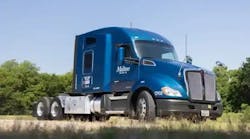The recent lockout at 29 West Coast ports, followed by President Bush's invoking of the Taft-Hartley Act forcing workers back on the job, may foreshadow trouble for other unions.
Claiming that labor unions were working too slowly after their contract expired in July, the Pacific Maritime Assns., which represents terminal operators, locked out 10,500 members of the International Longshore and Warehouse Union on September 29. The collateral damage of the 10-day lockout was enormous, with estimates of $1-billion to $2-billion losses daily to the nation's economy.
According to labor-management observers, each side hunkered down because they deemed their bargaining positions as equally strong. Both sides knew they could dig their heels in because of the monopoly nature of West Coast ports — business could not go elsewhere. But the fact that this was a lockout by management, instead of a strike called by labor, seems to indicate that management felt its position may have been slightly stronger.
Was the dispute so severe that the two sides couldn't have worked a little harder to reach an agreement, or was it unnecessarily pushed to a climax by management and then backed up by the Bush Administration?
Many in the labor camp believe it's the latter. “This is union busting,” says Edward Fier, president of the IUE-CWA, the International Union of Electronic, Electrical, Salaried, Machine and Furniture Workers-Communications Workers of America. “If he can get away with this, it's open season for other employers to use the same tactics that Reagan did in 1981 when he fired the unionized air traffic controllers,”
“The port situation was not insoluble,” adds Bill Barry, director of Labor Studies at the Community College of Baltimore County. “These were routine issues that should have been negotiated out.”
The issues were centered on the control of workers in an age of new technology. West Coast ports are woefully behind their counterparts overseas, especially in Asia. At the Port of Oakland, for example, clerks confirm incoming cargo deliveries with clipboards and some computers instead of scanning bar codes like workers at other ports. The clerks hand slips of papers to drivers telling them where to bring their loads. Crane operators load containers on ships, and drivers are given new slips of paper, which they hand to clerks upon exiting the port.
Management says that optical readers could cut these transactions from one hour or more down to 15 or 20 min., which would improve overall productivity. Oakland's output is less than 3,000 containers per acre of port space and Los Angeles/Long Beach about 4,000. Compare this to computerized ports in Asia: the KaoHsiung facility on Taiwan handles 19,000, Singapore 18,000, and Hong Kong 13,000.
Adding to the union's woes is the attitude of the general public. To many, union workers in this dispute appear to be obstructionists — and their case is not helped by lofty salaries. Clerks make up to $160,000 a year for relaying slips of paper.
Union officials says they are not opposed to new, more efficient technology; they simply want control over the workers who scan the bar codes and run the computer equipment.
The port lockout story doesn't bode well for other unions largely because of the administration's use of Taft-Hartley, which is perceived as a union-busting tactic. “The implications for unions are ominous,” says Barry.
Despite a favorable contract reached in August between the Teamsters and UPS — the largest wage and benefit increases in the company's history — it will be tough going for union negotiators. Teamster officials refused to comment on how the port lockout would affect upcoming talks, but Barry notes: “This is a club over the head of union negotiators as it concerns the Master Freight Agreement.”


